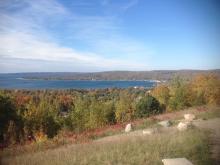Great Lakes Energy's Big Plan for Big Fiber - Community Broadband Bits Podcast 324

Great Lakes Energy (GLE) in Michigan decided in late 2017 to approve a plan to incrementally deploy Fiber-to-the-Home (FTTH) to cooperative members, beginning with a pilot project in Petoskey. This week, Vice President of Communications, Marketing and Energy Optimization Shari Culver from GLE joins Christopher to talk about what could possibly become the largest FTTH project in the state.
GLE anticipates offering its symmetrical Truestream Internet access to members in the pilot area as early as the end of October. The planning process, however, has involved several feasibility studies and at least two years of planning in addition to several more years of contemplation. Shari explains how the region GLE serves covers many different types of geographies, subscriber income levels, and different levels of Internet access competition. Some folks have only dial-up, while others have the option of cable Internet access. One of the challenges GLE faces is educating potential subscribers about the differences between what they have now and the potential with Truestream.
She explains that the cooperative has decided to approach deployment with a flexible incremental approach, carefully examining demand as they deploy to determine where they go next across their service area. There’s a significant portion of seasonal homes in this northern section of the lower peninsula, and GLE sees that high-quality Internet access can help boost local economic development if those seasonal visitors have the ability to stay longer by working from the cabin.
For more on the project, check out our coverage.
This show is 23 minutes long and can be played on this page or via Apple Podcasts or the tool of your choice using this feed.
Transcript below.
We want your feedback and suggestions for the show-please e-mail us or leave a comment below.
Listen to other episodes here or view all episodes in our index. See other podcasts from the Institute for Local Self-Reliance here.
Thanks to Arne Huseby for the music. The song is Warm Duck Shuffle and is licensed under a Creative Commons Attribution (3.0) license.




